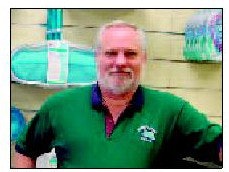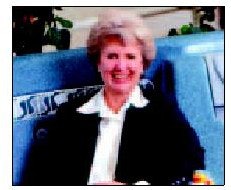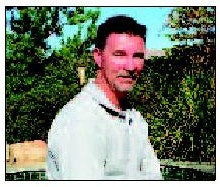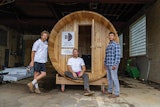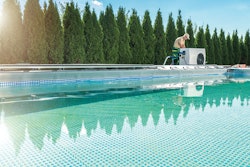
It is said that with age comes wisdom, and as the pool and spa industry has matured, its long-tenured workers have certainly gathered their share of wisdom. We thought it would be interesting and informative to see what some of these seasoned veterans had to say about their industry's past, present and future in the hope that it would, if nothing else, reinforce what many of you have probably already learned yourselves.
Although each of the six people we interviewed began in the industry at different times, in different areas and different specialties, their observations were strikingly similar. Most seem to think people in the industry are becoming more professional, they stress the importance of industry education and they feel technology is advancing by leaps and bounds. One thing they all agree on is that the secret to success is as simple as having fun on the job and treating customers with respect.
Harry Lanzillo Aquatics consultant
Harry Lanzillo entered the swimming pool industry in 1957 and says he became one of a small group of pioneers to establish the pool market in New England. Over the course of his long career, Lanzillo says, he has designed, sold and installed more than 5,000 pools and that his work with the First National Bank in Boston helped pool financing become available in the area. Lanzillo says he also established one of the first retail pool supply stores in northern New England, operated one of the first pool-only service companies in the area, and introduced above-ground pools to the Boston marketplace. In the process, he financed the college education of 100 employees, three of whom made the pool and spa business their life's work.
"One must derive more than money from what he does," Lanzillo says. "I have found great satisfaction in improving the lifestyle of thousands of families, and more thousands of individuals who avail themselves of the public facilities I have built. The thrill of transforming a virgin site into an aquascape that provides aesthetic quality while promoting family togetherness, healthful activity and just plain fun defies description. The travails of everyday business pale against the pleasure of these accomplishments."
Lanzillo says the industry has grown in the last 48 years, and as more people have gravitated toward it, they have brought with them an increased level of organizational skills, business acumen, technological capability and market-development skills. "In the future, the industry should continue its efforts to increase the level of professionalism among its members," Lanzillo says. "Formal education opportunities, now an integral part of most trade shows, should be expanded and upgraded to include everyone who works in this business."
Joe Jones Texas Blue Lake Pools
When Robert Lee Jones opened Texas Blue Lake Pools in 1955, he probably had no idea what a difference it would make in the lives of the people in his family. Joe Jones began working for his dad cleaning pools in 1958 at age 12. "My first swimming pools were within a couple blocks of my house. When it got to be further away, my sister drove me. I paid her half of what I earned to drive me there," he recalls. Joe's older brother, Robert Lee Jones Jr., also worked in the business on the construction crew. Joe worked summers and after school through high school (his high school sweetheart and now wife of 38 years, Pam, would often tag along and keep him company on jobs) and cleaned pools through college. After graduating from college in 1969, Joe purchased the company from his father. When Robert Jones Jr. returned from the Air Force, he joined Joe as his partner. The two remained partners until October 2004. Today, Joe's brother Sam is remodeling Texas Blue Lake Pools and his daughter is vice president of the company. ("My wife was with me on a service call, pregnant, the last night before she had her," Joe says.) His son is on contract with the company as an independent IT serviceperson.
In the 47 years since Joe began in the industry, one of the biggest changes he's seen is the emergence of big-box retailers selling pools and spas. Technology has also changed. "We were one of the very first pool companies to be seriously into computers," Jones says. "The first computers we bought were probably $10,000. Today for $400 or less you could buy that — and that would give you a lot more power than what we had." Since that time, Texas Blue Lake has tried to keep up with modern technology. "Just because we're old school doesn't mean we have to think like that," he says. In terms of service, however, this company continues to think with an "old school" mind-set. "We've seen so many companies come in and go out, it's unreal. I used to keep track, but I lost count. We try to train the customer that we're the best to put in their pool. And after we put it in, you've still got to go see someone about getting your water tested; you've got to buy your chemicals. So we try to convince the customer, remind them, that what they want is the service after the sale."
And good service means not shortchanging a customer to save a few dollars. "Lawsuits have a tendency to scare a lot of people in the swimming pool industry," says Joe. "I see [lawsuits] continuing to go up." However, he says, if you never use shortcuts and put quality workmanship into projects while emphasizing the importance of safety, chances are you won't have to worry about lawsuits.
Joe also thinks the economy will continue to "stay good," allowing people to spend more money on luxury items. "People are still leery of traveling abroad because of the terrorism, so they're looking to their home as their vacation spot."
In order to successfully design and build those dream vacation spots, Joe recommends industry members attend at least one of the many schools and seminars available to them. "Learn what you're doing," he says. "Don't ever stop learning. Don't ever think you know it all. Don't ever think there is only one way to do it. Keep looking for that better way. Go to trade shows. Find out what's going on, what equipment is new, what techniques are new. Don't be afraid to venture out." Most importantly, he says, "Be enthusiastic about it. Enjoy what you're doing. Remember, you're going to give a lot of people some fun, some enjoyment. You're going to make their life wonderful."
Elaine TurchRose City Pool & Spa
When Terry Turch returned to California in the early '60s after a stint in the Navy, he needed a job. He joined a friend working for a pool company, and in 1977, he and his wife, Elaine, started their own service company. They ran it out of their house for the first year, and the following year the couple opened a retail store selling basic chemicals. Today, Rose City Pool & Spa, located in Portland, Ore., sells pool and spa chemicals and tools, as well as lawn and garden accessories. This past winter, they added gift accessories and a larger selection of lawn and garden accessories to the renovated retail store.
Over the years, Elaine Turch says industry members have become more safety-conscious; however, she thinks the biggest change in the industry is software, which the company added about a year ago for water testing. "People tend to believe a computerized readout more than they will sometimes believe what you say," she says. "But it makes it so easy for the customer and so easy for us. What we stress is customer service. [Consumers] cannot go to a discount store, get their water analyzed in a computer and have knowledgeable staff answer their questions."
Turch believes further computer automation is in the swimming pool industry's future, and that newcomers should take advantage of the seminars offered. "Get yourself educated and educate your people, as well. Keep up with what's new, because when we started it was a little bit of chlorine and a little bit of acid and off you go.
"The pool industry is a strange industry. Once you start in it, for some reason it's hard to leave. It gets in the blood."
Bob Wason Gym and Swim
By 1965, Bob Wason, owner of Gym & Swim, Louisville, Ky., was already immersed in designing and outfitting athletic facilities, schools and other public entities. Because most of the designs for these facilities included swimming pools, Wason gradually transitioned to building them, which in turn led to his building residential swimming pools.
The industry has been good to him, he says, despite a recent leveling-off in business. "The last three years have been extremely flat, as far as growth is concerned, but we're starting to see the corner turn. We're finally starting to see the bigger projects come back."
Wason says he sees the industry becoming more professional than it was when he began working in it 40 years ago. "The industry has done a lot more to educate the builders," he says. "If they take advantage of it, there are a whole lot more educational opportunities out there [for them] to be better earlier in their careers." To people entering the industry, he says "educate your employees. Train them — it will come back 10-fold. Be honest. Treat the customer with respect and return to them a value they think they're paying for. Get the education you need to understand the business part of business, not just building pools."
In the future, Wason believes there will be more bells and whistles to make pools even more exciting. People who have money are willing to pay for excitement, and even people buying an entry-level pool want something that sizzles — they want something they can be proud of, he says.
Wason believes the sky's the limit when it comes to the possibilities for this industry. "I think no matter what you're building in the construction field, you're only limited by your ability to take a risk and do those new and exciting things," he says. "I don't think it's ever going to stop. I don't think there are any limits to the possibilities that we have out there."
Alice Cunningham Olympic Hot Tubs
Alice Cunningham was a successful bureaucrat with the United States Department of Labor (where she worked with a $60 million budget) before she and her husband, Blair Osborn, opened Olympic Hot Tubs in 1977. "I was always interested in the psychology of work," Cunningham says. "And I was always interested in the ideal workplace, as well as alternative work schemes." Osborn was a professor at the University of Washington who taught mechanical engineering when the two pondered whether men and women could work together. "That's why we wanted to start a business," Alice says. "The stupidest thing I've ever said in my entire life was, 'Well, let's start a business. How hard can that be.' We knew we wanted a product rather than a service, so we thought, 'Well, OK, you know, hot tubs. . . that sounds good.'"
It may have sounded good to them, but most people didn't even know what a hot tub was at that time, Cunningham says. "We had one in our front window and people would stop and come in and say, 'Well, what is that.' And our first banker, this old, Norwegian lady, said to me, 'Do you like beans?' And I said, 'What.' She said, 'Well, I hope you like beans, because you're going to be eating a lot of them with this business.' So now, hey, revenge — we're the largest company at that branch by far. But she really thought we were crazy. Doomed. Crazy and doomed."
Through the years, Olympic has survived and thrived, but Cunningham says it's much harder for somebody to open a business in this day and age. "When you have a new product," she says, "there are no expectations on the part of the public. They don't know what the stores should look like, what you should be doing for them in terms of delivery of the product and market. But as the market matures, in terms of people's expectations, you have to run a much bigger front and be much more organized than we ever were in the beginning."
Her best advice to anybody, she says, is to be aware of what it takes to be profitable, price your products accordingly, and hire "the absolute best people you can. Even if you feel that you're paying them, to start, more than you're paying yourself, it's worth it. We didn't learn that lesson until later on. Now everybody we hire is better than the person that left."
Beyond her business, Cunningham has also noticed improvements in the hot tubs themselves. "The manufacturing has gotten better; I think the products are more reliable," she says. "But with that comes another phenomenon — manufacturers change their products every year, and in the beginning they would change every five, six, seven years. So the whole process has sped up quite a bit.
"I think the market will continue to expand. One thing that we are seeing is that people who grew up with a hot tub are buying one sooner in their adult lives than people who have never had one."
Most importantly, Cunningham says, have fun with your business. "If you have fun, the customers will have fun."
Don Wall The Pool Doctor
Seventeen years ago, Don Wall was an unhappy electrical engineer who hated sitting behind a desk. When he heard of a small pool route for sale, he scraped together $20,000 and purchased it. "The reality was it was probably the only business I could afford at the time," Wall says. "I was pretty young and had a family and I just didn't have the dollars to get into any other kind of business."
After eight years of building the company, Wall stopped servicing pools and began remodeling and building them instead. For the past nine years he has been remodeling exclusively. "It's always been pretty steady as far as the amount of work and income," he says. "I haven't ever had a worse year than the year before, let's put it that way. Every year my income has gone up."
Wall says industry members' income in general (but especially service people) has been on the rise. "I know the service industry part of it has improved a little bit as far as the amount of money the guys are able to get for the services," he says. "The amount of money people are paying for swimming pools has dramatically increased. What used to be little kidney-shaped pools with 3 feet of concrete around it has now turned into $100,000 pools with barbecues, water features and slides.
"I just accepted a bid for a $71,000 remodel of a swimming pool. That's just a heap of money for a remodel. That's many times more than people were even paying for a new pool 10 or 15 years ago."
Wall also thinks the industry is becoming much more professional than it was even 17 years ago, with an emphasis on safety. "I know the industry is making a huge effort in many different ways to let homeowners know about safety with their pools," he says. "I see a lot more pool fences than I used to see. In fact, this pool that I'm remodeling has an existing pool fence. Fifteen years ago you never went to a backyard that had a pool fence."
He recommends that people new to the industry attend trade shows to learn about safety and other interesting topics, which will help them to progress quickly in their careers. Become a member of an association, he adds, and "be a person of good character, because it's a very small industry and good news gets out quick, but so does bad news."
Overall, Wall says he is optimistic the industry will continue moving in a positive direction. "I think the reason for that is people want that backyard-oasis thing. They don't want to travel away from their home to have a good time with their family. They want to create that right there in their backyard."
